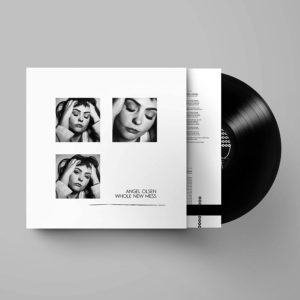Angel Olsen’s fans have just finished sobbing along to her previous album, All Mirrors (2019), whose tracks sorted through her reflections after the disintegration of a five-year relationship. And now Olsen sends us Whole New Mess, an album containing different recordings of nine of those songs. Is it time to sob along all over again? Why would she do this to us?
Considering the Enya-thick production of All Mirrors, with its wash of synthesizers that, at its fullest, might send New Agers scrambling to fetch their crystals, Whole New Mess swiftly turns in the opposite direction, stripping down the instrumentation to just Olsen’s voice and guitar. As if to reassure us that yes, Olsen is still a singer-songwriter.

Olsen, who originally recorded Whole New Mess as demos for All Mirrors, must have realized early on that both arrangement styles could prove effective at captivating her listeners with her lyrics of heartbreak and resilience. On one hand, the grand, haunting strings of “Lark” on All Mirrors place us inside a windowless vessel whose thumping energy builds until blasting off in a crescendo — dragging away one of the ex-lovers with it, sealing the divide. The Whole New Mess’ version, however, hits us from a different, more personal direction, positioning both parties across from one another. The lyrics of the former end with “Trouble from the start / Trouble with the heart” – a distant thought – while those of the latter include an extra stanza, ending with the ex-couple’s shared observation that presents the subject of the track’s title (“Aren’t they pretty when they’re singing? / … Crying in the dark / Bird out on the lawn”).
All Mirrors’ guitar-free “New Love Cassette” sheds its sea of Melody Nelson strings and instead offers a skeletal, Liz Phairish dose of pure melody on its sister album. Olsen trades the upbeat gait and sweet breathiness of “Too Easy” on the former for a slower, more vulnerable delivery, whose intensity and halo of distortion recalls but fails to outshine her work on Burn Your Fire for No Witness (2014).
The passage of time between the recordings reveals how Olsen’s outlook has subtly shifted: on Whole New Mess, her pain is fresher, the mood is darker. All Mirrors finds Olsen emerging from the murky funk, exuding more confidence, finding more resolution. Whole New Mess’ title track, in which Olsen wrapped her road to self-reliance (“I’ll be gettin’ back on track / Back to my own head”) in a deceptively beautiful lullaby sprinkled with gentle mini-yodels, does not appear on All Mirrors. “Spring,” one of All Mirrors’ more optimistic tracks, probing the pop-sensible space between George Harrison and Saint Vincent, is absent from Whole New Mess.
The overlapping song selections on the two albums also afford the listener an unexpected bonus: a window into Olsen’s songwriting process. Comparing the releases in the order in which she recorded them, we see that the song “Tonight (without you)” became simply “Tonight.” Likewise, Olsen removed the nerve-tapping “and all those things that I was made to feel / it doesn’t matter if they are right or real / my heart will still split in two” on Whole New Mess’ “Summer,” while also trimming off some redundant lyrics.
Some areas remained stubbornly consistent. Olsen squandered two tries to rework the powerfully dark “Impasse,” whose monotonous crawl draws away focus from both albums. Perhaps stemming from her fondness of 45 rpm-era ballads from acts such as The Shirelles and Roy Orbison, whose sound she has reinvented on several of her albums, Olsen is no stranger to reverb. But on her latest two releases, she indulged to questionable heights. On Whole New Mess, Olsen’s vocals, at times, flounder in a flood of natural reverberation off the walls of an Anacortes, Washington-based church-turned-studio, known as The Unknown. Olsen cultivated a more controlled reverb on the majority of the tracks on All Mirrors with producer John Congleton, yet still probing depths rarely heard since mullets and shoulder pads were all the rage.
As for Olsen’s aforementioned Orbison / Shirelles sound, she revisits it here as well. “Chance” keeps her tradition alive on both albums, with Whole New Mess’ take leaving the dance floor behind and adopting a gentle but guarded yearning (“I’m not looking for the answer / Or anything that lasts / I just want to see some beauty”).
Angel Olsen has experimented with many styles and instrumentation lineups to support her songwriting—the folksy sparseness of her early work, the Americana-infused indie rock of Burn Your Fire for No Witness, the more pop-informed My Woman, and now her yin-and-yang sibling releases. While Whole New Mess suffers from a few problematic recording choices, her songwriting still reaches out and seizes you, albeit not with the same grip of her previous albums.

